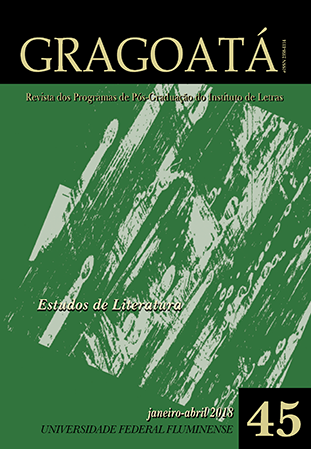The right to the “other” memory – on 'Ainda estou aqui', by Marcelo Rubens Paiva
DOI:
https://doi.org/10.22409/gragoata.v23i45.33570Keywords:
contemporary literature, memories, democracy, archives.Abstract
This text deals with Marcelo Rubens Paiva’s memoir Ainda estou aqui, regarding what allows us to think that questions about the writer’s position, about the use of archives, about life as a living matter of the fiction, although placed, generally, as a certain conformation of literature to the dictates of the present, may, on the contrary, emphasize ways in which the literary, in the constitution of its place, does not exempt itself from pointing the limits of other discourses, in a kind of altercation against what was already said. The documentary setting of Paiva’s book, in which newspaper articles, documents from judicial processes, testimonies and even photography are displayed, causes the story to be decomposed, exposing the violence with which it is constructed. Without self-pity, the author exposes two mournings: one that began with the torture and death of his father, the politician and federal deputy Rubens Paiva, by the Brazilian military dictatorship, and the one that he experiences at the time he writes, when he accompanies the development of Alzheimer’s disease in his mother, Eunice Paiva. He traces the profile of the female protagonist, who, in the flashes of lucidity, repeats: “I am still here,” pointing out how the endless mourning for the father and the step by step mourning for the mother are narratives that tell a lot about the present state of things. This reading is based, mainly, on the reflections of Didi-Huberman, Jacques Rancière and Jacques Derrida on politics, on the act of taking a stand and on democracy.
---
Downloads
Downloads
Published
How to Cite
Issue
Section
License
Authors who publish in Gragoatá agree to the following terms:
The authors retain the rights and give the journal the right to the first publication, simultaneously subject to a Creative Commons license CC-BY-NC 4.0, which allows sharing by third parties with due mention to the author and the first publication by Gragoatá.
Authors may enter into additional and separate contractual arrangements for the non-exclusive distribution of the published version of the work (for example, posting it in an institutional repository or publishing it in a book), with recognition of its initial publication in Gragoatá.

Gragoatá is licensed under a Creative Commons - Attribution-NonCommercial 4.0 International.














